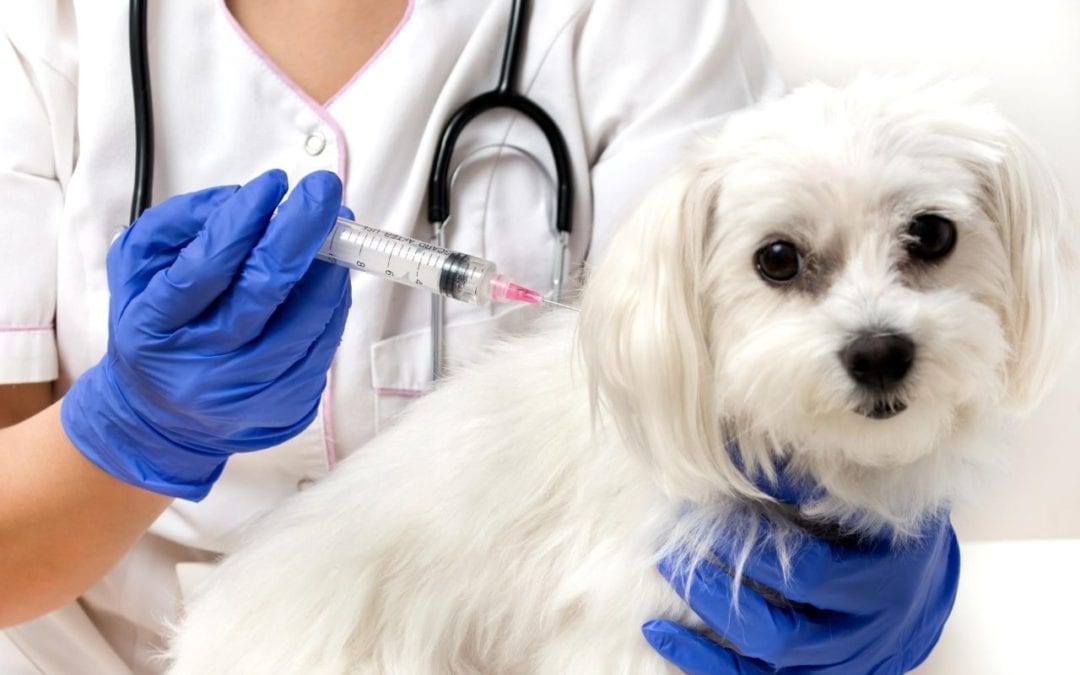Happy August, my favorite month of the year! It’s also national pet immunization awareness month. Living in a global pandemic, we can all understand the importance of immunizations, or vaccines, for keeping our pets safe. Vaccines work by stimulating an immune response by familiarizing their system to the specific disease particle. Having this pathogen-specific immunity allows them to respond faster if they are exposed and prevent or lessen the severity of signs associated with the disease.
Vaccinating your pet is a relatively inexpensive but hugely important way to protect their health. In addition to preventing many life-threatening illnesses, vaccinations can prevent diseases prevalent in wildlife and those that can be passed to humans, such as Rabies. While any medical treatment involves some degree of risk, in the case of vaccinations, the benefits far outweigh any potential side effects. Adverse reactions are rare, and when they do occur they are usually mild and short-term. It’s important to note that all cats and dogs—even those that live primarily indoors—should be vaccinated. Additionally, places you may frequently visit such as boarding kennels, dog parks and grooming salons are environments that pose a higher risk for transmission of contagious diseases. Talking with your veterinarian is the best way to decide which vaccines your pet needs based on their individual lifestyle.
Some vaccines are core, or recommended for all pets, while others are considered based on lifestyle and individualized for your pet. Here is the list of common vaccines:
Canine Immunizations:
- Rabies virus – core vaccine
- DHPP (Distemper, Hepatitis, Para-Influenza, Parvovirus combo) – core vaccine
- Leptospirosis – Dogs acquire lepto from water sources that are contaminated with urine from infected rodents, livestock, or wildlife. This vaccine is recommended for dogs that play or drink from streams, ponds, rivers, or ditches.
- Bordetella (Kennel Cough) – this is required for dogs that go to doggie daycare, groomers, or boarding as the virus causes an extremely contagious upper respiratory disease.
- Influenza virus – this causes respiratory disease of dogs and has been implicated in contagious outbreaks at boarding facilities and shelters in various regions throughout the country
- Lyme disease – Although infrequent, we do see cases of Lyme disease in Colorado. It is recommended for dogs that travel to the east coast area where it is endemic
Feline Immunizations:
- Rabies virus – core vaccine
- FVRCP (Feline viral rhinotracheitis, calicivirus, panleukopenia combo) – core vaccine
- FeLV (Feline Leukemia Virus) – transmitted from mother cats to their kittens and through contact between cats through co-grooming
- Feline Immunodeficiency Virus (FIV) – FIV is a viral infection that is only transmitted through close contact, especially fighting. This vaccine is generally recommended for cats that go outdoors and come into contact with unknown cats.
- Feline Infectious Peritonitis (FIP). A viral infection most common in catteries and feral colonies, FIP is almost always fatal. Most house cats do not have a significant risk of contracting this disease.
Talk to your vet to discover how often your pet should get vaccinated and what factors should guide immunizations including breed, age, health, lifestyle (indoor vs outdoor), foods they eat, and others. Your lifestyle and whether you travel with your pets may also impact the vet’s recommendations on your pets’ vaccinations.
This August, check your pet’s immunization records to see if he/she missed vaccinations during the initial stages of the COVID-19 shutdown. As we enter the “new norm”, it’s important that your pet’s immunizations are up to date to protect him/her against preventable diseases. Book an appointment today to protect your pets!

